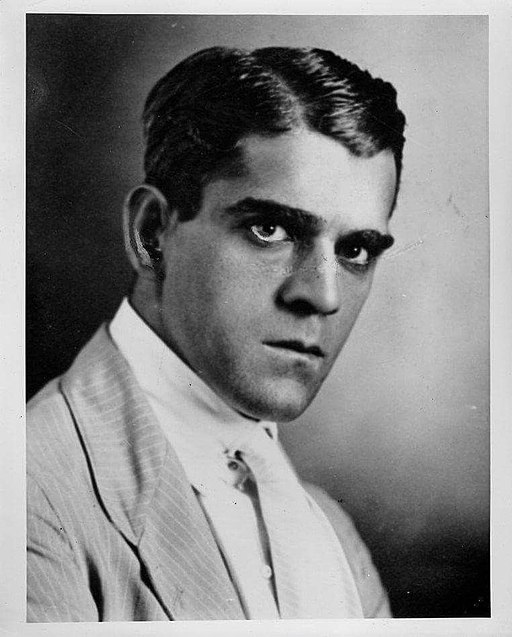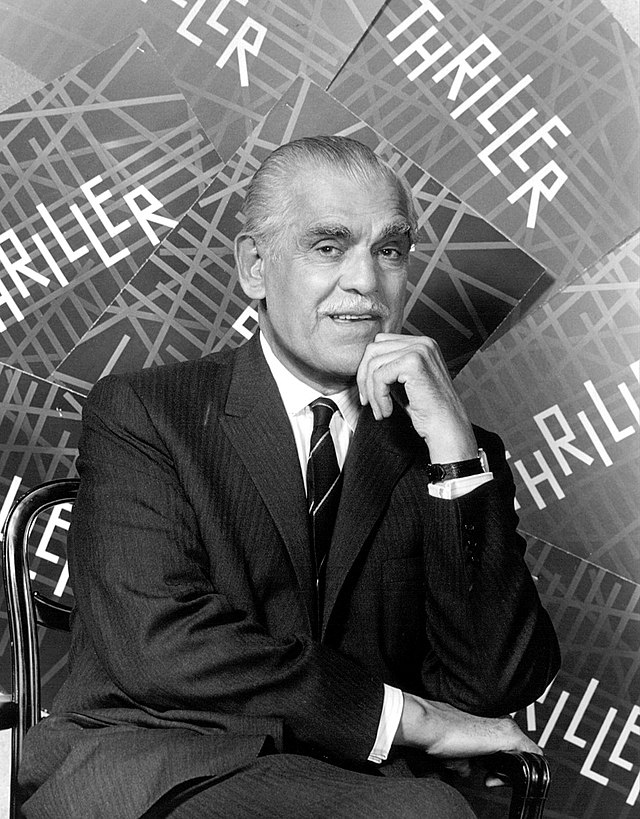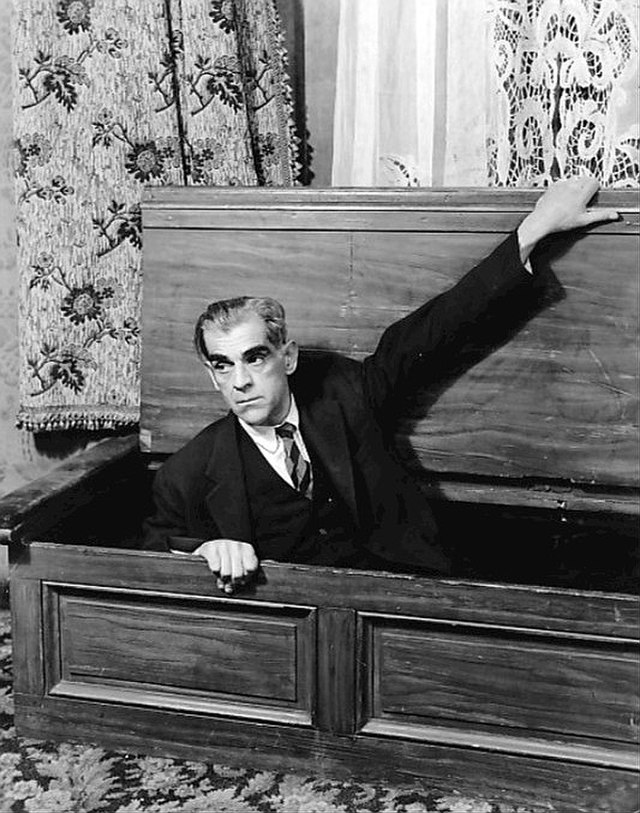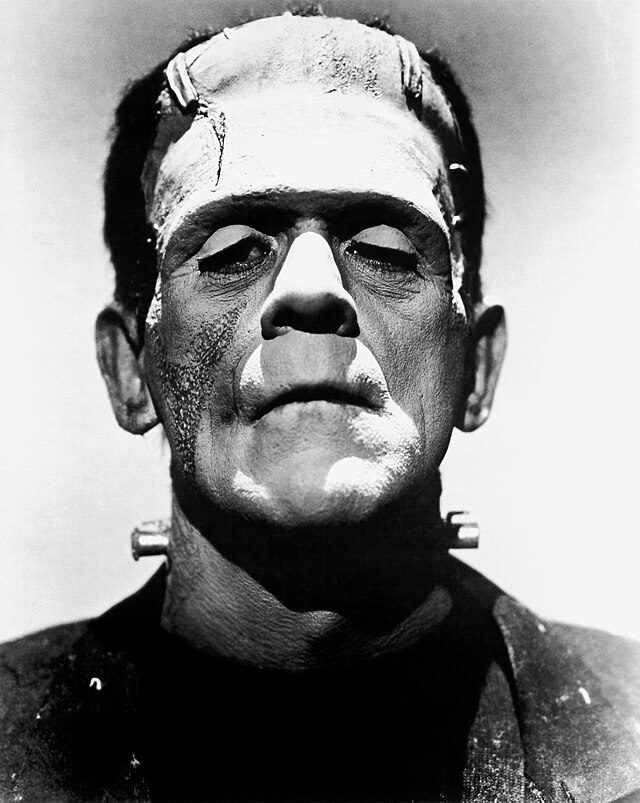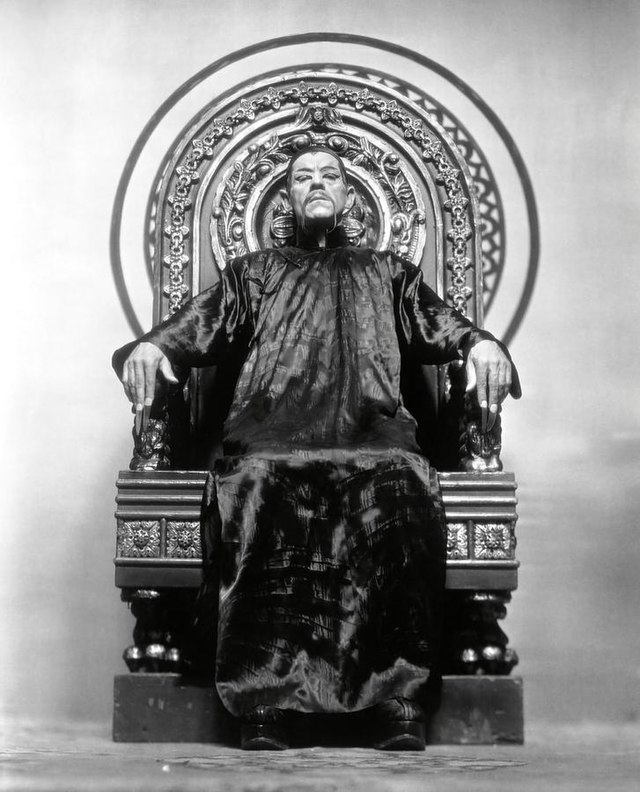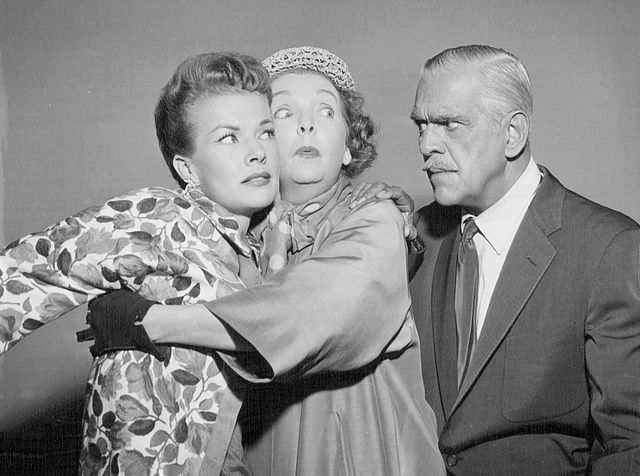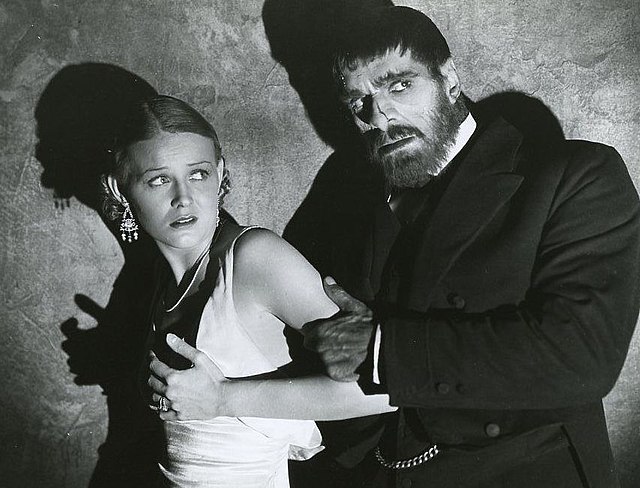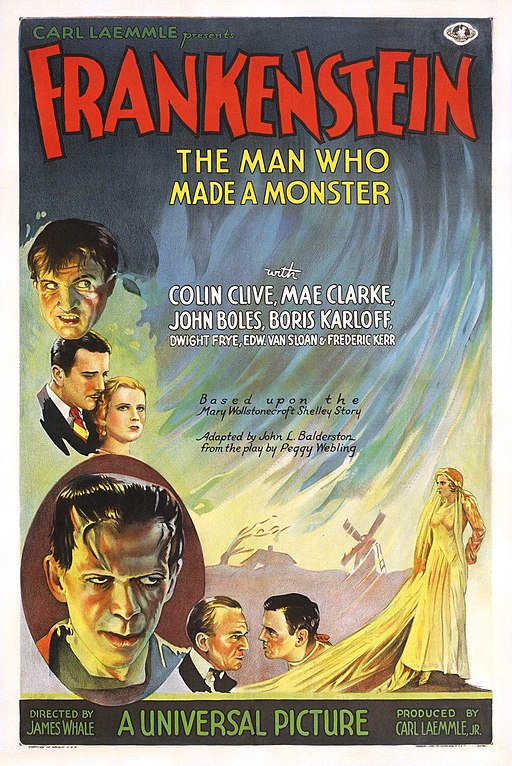Boris Karloff
back| Full Name | William Henry Pratt |
| Stage Name | Boris Karloff |
| Born | November 23, 1887 |
| Birthplace | Camberwell, London, England |
| Died | February 2, 1969 |
| Buried | Forest Lawn Memorial Park, California, USA |
| Married to | Grace Harding (m. 1910; div. 1913) - Monty (Dorothy) Karloff (m. 1920; div. 1946) - Evelyn Hope Helmore (m. 1946; until his death in 1969) |
| Children | Sara Karloff (daughter with Dorothy) |
| Notable films | Frankenstein (1931) - The Mummy (1932) - Bride of Frankenstein (1935) - The Raven (1935) - Son of Frankenstein (1939) - The Body Snatcher (1945) |
Boris Karloff
The King of Horror
Boris Karloff rose to fame as an iconic figure in horror cinema. His breakthrough came with his chilling portrayal of the Monster in "Frankenstein" (1931), followed by memorable roles in "The Mummy" (1932) and "Bride of Frankenstein" (1935).
Karloff's deep voice, imposing presence, and ability to evoke sympathy in monstrous roles set him apart. Beyond horror, he showcased his versatility in film, television, and radio, earning a star on the Hollywood Walk of Fame in 1960.
Known for his kindness and wit off-screen, Karloff left a lasting legacy as a beloved actor and cultural icon.
Related
Boris Karloff (1887 – 1969)
Biography, Movie Career and his Movies
Born William Henry Pratt on November 23, 1887, in Camberwell, London, Boris Karloff would later become synonymous with horror cinema. He was the youngest of nine children born to Edward John Pratt Jr., Deputy Commissioner of Customs Salt and Opium, and his wife Eliza Sarah Millard. His mother encouraged him to adopt a classical education, which included elocution lessons, shaping his early interest in acting.
Path Towards Success: Boris Karloff embarked on his acting career in Canada in the early 1900s, initially performing in repertory theatre. In 1910, he moved to the United States, where he continued to work in theatre, adopting the stage name "Boris Karloff" in the 1920s. He gained recognition on Broadway and in silent films during the 1910s and 1920s, although it was his role as the Monster in the 1931 film "Frankenstein" that propelled him to international fame and established his career as a horror icon. Karloff's ability to portray complex characters with depth and empathy, even in monstrous roles, set him apart and endeared him to audiences.
Marriages and Personal Life: Boris Karloff was married three times:
- His first marriage was to Grace Harding in 1910, which ended in divorce in 1913.
- His second marriage was to Monty (Dorothy) Karloff in 1920, with whom he had a daughter named Sara.
- His third marriage was to Evelyn Hope Helmore in 1946, which lasted until his death in 1969.
Outside of acting, Karloff was known for his gentle demeanor and philanthropic efforts. He was passionate about cricket and spent much of his free time playing and promoting the sport, even coaching children in Los Angeles.
Later Years and Legacy: Throughout the 1930s and 1940s, Boris Karloff continued to star in numerous horror films, solidifying his status as a genre legend. He appeared in classics such as "The Mummy" (1932), "Bride of Frankenstein" (1935), and "The Body Snatcher" (1945). As the horror genre evolved, Karloff adapted, showcasing his versatility in both chilling and comedic roles.
In his later years, Karloff remained active in film, television, and radio. He lent his distinctive voice to narrations and voice-over work, further cementing his legacy in popular culture.
Death and Cause of Death: Boris Karloff passed away on February 2, 1969, at the age of 81. The cause of death was pneumonia, exacerbated by emphysema, a condition he had struggled with in his later years.
Legacy: Boris Karloff's contributions to cinema, particularly within the horror genre, are immeasurable. His portrayal of Frankenstein's Monster remains iconic, influencing countless actors and filmmakers. Beyond his roles, Karloff's philanthropy and kindness are remembered fondly by those who knew him personally. His legacy continues to thrive through the timeless appeal of his films and the enduring fascination with his unique talent for embodying both terror and empathy on screen.
House and Grave of Boris Karloff:
Explicit Acting Style of Boris Karloff:
Boris Karloff's acting style is characterized by a unique blend of physicality, vocal expressiveness, and a profound ability to convey empathy even in monstrous roles. Here's a detailed analysis of his acting style:
Physical Presence: Karloff's physical appearance was striking, often enhanced by makeup and prosthetics that transformed him into iconic monsters like Frankenstein's Monster and Imhotep from "The Mummy." Despite the heavy makeup, Karloff used subtle movements and gestures to convey emotions and inner turmoil. His towering stature and commanding presence lent an air of authority and menace to his characters, yet he could also evoke vulnerability and loneliness through nuanced expressions.
Vocal Modulation: One of Karloff's most distinctive features was his deep, resonant voice. He used his voice skillfully to imbue his characters with a range of emotions, from chilling menace to haunting melancholy. Whether growling as the Monster or speaking with cultured refinement as Dr. Fu Manchu, Karloff's vocal versatility added layers of complexity to his performances. His precise articulation and ability to modulate tone and cadence contributed to the depth of his characterizations.
Emotional Depth and Pathos: Despite often portraying monstrous or villainous characters, Karloff infused his roles with a sense of humanity and pathos. He approached each character with empathy, delving into their psychological depths to understand their motivations and fears. This empathetic approach allowed audiences to connect with his characters on a deeper level, transcending mere horror and instilling a sense of tragedy and sympathy for even the most terrifying figures.
Mastery of Subtlety: Karloff's acting style was marked by subtlety and restraint. He eschewed melodramatic theatrics in favor of understated gestures and expressions, relying on the power of suggestion rather than overt displays of emotion. This understated approach heightened the tension and suspense in his films, drawing audiences into the psychological complexities of his characters.
Adaptability and Versatility: Throughout his career, Karloff demonstrated remarkable versatility, seamlessly transitioning between horror, drama, comedy, and even romance. His ability to inhabit diverse roles showcased his range as an actor, proving his proficiency beyond the confines of horror cinema. Whether playing a mad scientist, a misunderstood monster, or a calculating villain, Karloff brought authenticity and depth to each role, leaving an indelible mark on every genre he explored.
Legacy and Influence: Boris Karloff's legacy continues to influence actors and filmmakers, particularly within the horror genre. His pioneering work in horror helped redefine the portrayal of monsters on screen, emphasizing psychological complexity and human frailty. Beyond his technical prowess, Karloff's enduring appeal lies in his ability to evoke both terror and empathy, making him a timeless icon of cinema whose contributions continue to resonate with audiences worldwide.
Memorable Quotes from Boris Karloff:
· On his most famous role as Frankenstein's Monster:
"It's alive! It's alive!"
· Reflecting on his career:
"The monster was the best friend I ever had."
· On the enduring appeal of horror films:
"You could enthrall people and hold them silent, waiting for the next shock."
· On his approach to acting:
"I have always been cast as the villain, and that, I believe, is the key to my success."
· Discussing his perspective on life:
"If you're lucky enough to be asked to do the same thing again, you're a lucky person. So I think that luck has been with me, and I hope it will continue."
What did Others say about Boris Karloff?
· Vincent Price (fellow horror icon):
"Boris Karloff was truly one of the gentlest and kindest men I have ever known. He also had a great sense of humor, a deep, dark voice, and an almost infinite capacity for appreciation and enjoyment."
· Roger Ebert (film critic):
"The greatness of Karloff in the horror films, of course, was that his monsters were not merely murderous but tragic. They were like grotesque reflections of the human condition."
· James Whale (director of "Frankenstein" and "Bride of Frankenstein"):
"I would love to have Boris for every picture I make. He was a gentleman, a very serious and thoughtful actor, and great fun to work with."
· Peter Bogdanovich (director and critic):
"Karloff is terrific, a consummate actor and a lovely man."
· Martin Landau (actor and Karloff biographer):
"Boris was a man whose humanity and interest in others was as evident as his talent. He was self-effacing, humble, and almost always at peace with the world."
Awards and Recognition:
Honorary Awards:
1967: Boris Karloff received a star on the Hollywood Walk of Fame for his contributions to motion pictures, located at 1737 Vine Street.
Legacy and Recognition:
Although he did not win any competitive awards such as Oscars or Golden Globes, Boris Karloff's legacy as a horror icon and versatile actor has been honored in retrospective and tribute events.
Notable Movies starring Boris Karloff:
1930s:
- The Criminal Code (1931) - Karloff plays Galloway, a convict, in this Howard Hawks-directed drama about life in prison.
- Five Star Final (1931) - He portrays a murder victim in this Pre-Code drama about sensational journalism.
- Frankenstein (1931) - Karloff's breakout role as the Monster in this iconic adaptation of Mary Shelley's novel.
- The Old Dark House (1932) - He plays Morgan, a menacing butler, in this atmospheric horror film directed by James Whale.
- The Mummy (1932) - Karloff stars as Imhotep, an ancient Egyptian priest revived from the dead seeking his lost love.
- The Mask of Fu Manchu (1932) - He portrays the villainous Dr. Fu Manchu in this adventure film based on Sax Rohmer's novels.
- The Ghoul (1933) - Karloff plays Professor Morlant, an Egyptologist who rises from the dead.
- Bride of Frankenstein (1935) - Reprising his role as the Monster, Karloff delivers a poignant performance in this sequel.
- The Raven (1935) - Co-starring with Bela Lugosi, he plays a surgeon obsessed with Poe's poem.
- Son of Frankenstein (1939) - Returning as the Monster, Karloff interacts with Basil Rathbone and Bela Lugosi in this sequel.
1940s:
- The Man They Could Not Hang (1939) - Karloff plays a scientist experimenting with bringing the dead back to life.
- The Devil Commands (1941) - He portrays a scientist exploring telepathy and communication with the dead.
- The Body Snatcher (1945) - Karloff stars alongside Bela Lugosi in this adaptation of Robert Louis Stevenson's story.
- Isle of the Dead (1945) - He plays a military officer in this horror film set during the Greek War of Independence.
- Bedlam (1946) - Karloff portrays the cruel master of a mental asylum in this historical horror film.
- Abbott and Costello Meet the Killer, Boris Karloff (1949) - He appears as a suspect in this comedy-mystery film.
1950s:
- The Strange Door (1951) - He plays the villainous Sire Alain de Maletroit in this Gothic horror film.
- The Black Castle (1952) - Karloff portrays the sinister Count von Bruno in this adventure film.
- Abbott and Costello Meet Dr. Jekyll and Mr. Hyde (1953) - He plays the infamous dual role in this comedy-horror crossover.
- The Black Sleep (1956) - Karloff stars as a doctor experimenting with anesthetic gases and their effects on the brain.
- Voodoo Island (1957) - He portrays a doctor investigating mysterious deaths on a tropical island.
- Frankenstein 1970 (1958) - Karloff stars as Baron Victor von Frankenstein in this science fiction horror film.
1960s:
- Black Sabbath (1963) - Karloff appears in the segment "The Wurdalak" in this Italian horror anthology film.
- The Raven (1963) - In a comedic role, Karloff stars alongside Vincent Price and Peter Lorre in this horror-comedy.
- The Terror (1963) - He plays the Baron von Leppe in this Roger Corman-directed horror film.
- Die, Monster, Die! (1965) - Karloff stars as Nahum Witley, a scientist guarding a family secret in this adaptation of H.P. Lovecraft's "The Colour Out of Space."
- The Sorcerers (1967) - He plays Professor Montserrat, who invents a device to control other people's minds.

